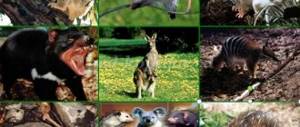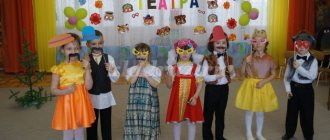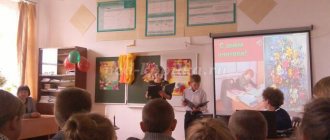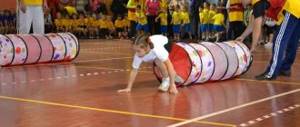Leading.
Good afternoon, dear viewers! You are present at the game “Man and Profession”.
There are about 50 thousand different professions in the world. Every year, 25 million people change their jobs, 12% of them return...
Making a good choice of profession means choosing a job that society needs, i.e. in demand in the labor market. This is the first thing. Secondly, it should be accessible to you due to the totality of your natural abilities and acquired knowledge, skills and abilities and, finally, bring joy, satisfaction and income.
Our school conducted a survey among students in grades 8–11 on the topic “The World of Professions.”
To the question “Who do you want to be?” The following answers were received: driver, cosmetologist, doctor, lawyer, hairdresser, programmer. A total of 22 professions are named.
Students consider the professions of the 21st century to be: programmer, teacher, driver, medical worker, manager, lawyer, economist. A total of 33 professions are named.
According to respondents, the following professions that have gone back centuries can be considered: cleaner, janitor, tractor driver, agronomist, shepherd, milkmaid. A total of 37 professions are named.
From public opinion polls it is clear that not all schoolchildren know new professions that are currently in great demand. Today we will check whether the players know about them.
Jury presentation.
So, meet our players. Today two teams are playing: an 8th grade team and a 9th grade team.
Team presentation.
Leading.
Before moving on to Game 1, I'll explain the rules.
1. The game consists of 5 theoretical competitions (games) and 2 practical ones.
2. If a team does not give the correct answer, then fans can answer the question and earn 1 point for their team.
3. The team with the most points wins.
4. In addition to regular participants, the teams will also have assistants from among the spectators (parents, guests, teachers).
— Dear viewers! You have color cards that will tell you which team you will be helping. There are numbers on the cards, they show the number of the game in which you will take part.
Now I announce the beginning of game 1. I ask the spectators whose cards have the number 1 on them to take their places in the teams.
Game 1 “Warm-up”
Condition:
Teams take turns answering the question. Thinking time is 30 seconds.
1. Name an object used in medical work, tailoring and music lessons. (Needle)
2. Who could the cat Matroskin from the cartoon “Vacation in Prostokvashino” work today? (Businessman, livestock breeder, chairman)
3. What could the wolf from the fairy tale “The Wolf and the Seven Little Goats” do today? (Parodist)
4. Harsh time of nature:
The leaves moan in the wind,
It's not days that slip away, but years,
But all this is to my liking!
Name the profession of the person who wrote these lines . (Poet)
5. Even though I was still a girl
Gas station rules.
And in logging
She showed skill in cabbage soup.
State the name of the actress and the name of the films in question. (N. Rumyantseva “Queen of the Gas Station”, “Girls”)
6. Which of the kings knew 14 crafts? Name the king and at least 6 crafts that he mastered.
(Peter
I - carpenter, shipbuilder, blacksmith, turner, gunsmith, sailor, etc.)
7. “Black box” is a question for both teams.
The “black box” contains tools used in the work of a musician, steelmaker, or doctor. Name this tool. (Spoon. Spoon-playing musicians; a doctor at home checks a patient’s pharynx with an ordinary spoon; steelworkers take a sample of steel with a special spoon)
Musical pause
The jury speaks (performance + game 1)
Game 2 “Troubles from a Barrel” (teams take turns taking a barrel with a question number from a bag)
Condition:
guess the name of the profession using 5 hints from the presenter. After each clue, players have the opportunity to provide an answer.
Question No. 1
1. They are characterized by physical endurance, patriotism, common sense, leadership qualities, basic knowledge of psychology, history, and economics. Excellent knowledge of your service – 5 points
2. Changes his place of residence and work several times during his service. Employment is determined by the terms of the contract – 4 points.
3. Salary is determined by rank, position, length of service - 3 points.
4. Can work in extreme situations. Engaged in the training of young soldiers, analyzes military actions, develops military plans, documents, organizes military service and the life of soldiers - 2 points.
5. Oleg Gazmanov sings that their heart is at gunpoint, and their career begins at military school - 1 point
(AN OFFICER)
- State educational institution "Moscow Border Institute of the Federal Security Service of the Russian Federation" (MPI FSB of the Russian Federation)
129328, Moscow, st. Ostashkovskaya, 15
- Border Academy of the Federal Security Service of the Russian Federation (PA FSB RF)
125040, Moscow, Leningradsky pr., 3, bldg. 5
- Military University of the Russian Defense Ministry
Addresses:
Territory No. 1, Mayakovka: 123001, Moscow, st. Bolshaya Sadovaya, 14;
Territory No. 2, Lefortovo: 109033, Moscow, st. Volochaevskaya, 3/4;
Territory No. 3, Khamovniki: Moscow, Komsomolsky Prospekt, 20.
Question No. 2
1. This profession is thriving all over the world. This is a doctor who must find the cause of the patient’s mental discomfort - 5 points.
2. Must be able to listen to others, have common sense, analytical skills, logical thinking, empathy for people – 4 points.
3. Consultations with this specialist are most often paid. In many countries, he is a friend and adviser to 50-80% of the population - 3 points.
4. Don’t spare money on your health!
This is the main condition in life.
Why? Yes, simply because
What without mental health
We don't need money!
He studies the causes of mental disorders - 2 points.
5. Psychotherapy has existed since time immemorial. In the 19th century, it was glorified by the doctor Sigmund Freud - 1 point
(psychotherapist)
- Tula State University
Tula, Lenin Ave., 92
- State budgetary educational institution of higher professional education “Ryazan State Medical University named after Academician I.P. Pavlov" of the Ministry of Health of the Russian Federation
390026 Ryazan, st. High-voltage, 9
- State educational institution of secondary vocational education "Tula Regional Medical College"
300034, Tula region, Tula, st. Khalturina, 1
Specialties: paramedic, nurse, medical laboratory technician
- State educational institution of secondary vocational education "Tula Regional Medical School No. 1 (technical school)"
301600, Tula region, Uzlovaya, st. Beklemishcheva, 83
Specialties: paramedic, nurse
Question #3
1.They are sometimes called literalists and pedants, they have to interpret specific articles of codes, laws, documents - 5 points.
2. They know how to persuade, pose and solve problems, negotiate, have the qualities of a researcher, practical psychology skills, and master technical means - 4 points.
3. Predict the consequences of applying legal norms, prepare contracts, wills, lawsuits, communicate with clients - 3 points.
4. As you know, truth does not burn in fire and does not sink in water. A specialist has to defend the truth, be careful, flexible – 2 points.
5. Today, more and more attention is paid to issues of legal regulation of business - 1 point
(LAWYER)
1.Tula State University
Tula, Lenin Ave., 92
2.Military University of the Russian Defense Ministry
Addresses:
Territory No. 1, Mayakovka: 123001, Moscow, st. Bolshaya Sadovaya, 14;
Territory No. 2, Lefortovo: 109033, Moscow, st. Volochaevskaya, 3/4;
Territory No. 3, Khamovniki: Moscow, Komsomolsky Prospekt, 20.
Question #4
1. This specialist is called upon to compensate for the shortcomings of nature. The vast majority of clients are women - 5 points.
2. Consults clients on nutritional issues, performs procedures, writes prescriptions, studies the causes of minor illnesses – 4 points.
3. Has the following skills and abilities: willingness to serve the client, ability to promote goods and services, experience in selling various creams, masks, etc. – 3 points.
4. They serve beauty:
Beauty is more mysterious, brighter and wider,
It’s as if there are keys to happiness hanging everywhere – 2 points.
5. They do masks, manicures, pedicures, and apply compresses. Work in hairdressing salons, beauty salons, or have their own practice - 1 point
(COSMETOLOGIST)
- State budgetary educational institution of higher professional education “Ryazan State Medical University named after Academician I.P. Pavlov" of the Ministry of Health of the Russian Federation
390026 Ryazan, st. High-voltage, 9
Question #5
1. These specialists always look elegant in appearance, have their own uniform, many people entrust their lives to them - 5 points.
2. The specialty requires excellent health. These specialists are responsible for studying the optimal route, monitoring all instruments, communicating with dispatchers and other services - 4 points.
3. The employee must have sharp vision, good hearing, developed motor memory, high performance – 3 points.
4. Must prepare all flight documentation, be ready to work in extreme conditions, have a sense of safety and empathy for people – 2 points.
5. They can sing:
First thing, first thing planes,
Well, girls, and then girls - 1 point
(PILOT)
Musical pause
Question #6
1. The specialist determines which accounts should include income and which should include expenses. Today there are more than 1 million such specialists in Russia - 5 points.
2. They must take into account every ruble spent or earned by the company. He must be able to work with figures and numbers, in a team - 4 points.
3. The specialist must have analytical skills, logical thinking, and accuracy. Show thrift and aversion to corruption – 3 points.
4. Part of the work of this specialist can be characterized by sayings: “Money loves counting”, “Money is counting” - 2 points.
5. This work requires special care and responsibility. The main result of the specialist’s work is a balance sheet, which is submitted quarterly to the tax authorities. In Russia, the position was established by Peter I in 1700 - 1 point
(ACCOUNTANT)
1.Tula State University
Tula, Lenin Ave., 92
Career guidance work in elementary school. educational material on the topic
"When a person does not know
what pier is he heading to?
no wind for him
will not be favorable.”
Seneca.
The question “Who should I be?” - vital for every person. The answer to it has an impact on the rest of your life. Don’t get confused, get your bearings correctly, find your place in the world of professions. Vocational guidance is designed to help a child find his place in life.
Career guidance work at school is provided for by the curriculum and includes four stages:
Stage 1 – primary school.
Stage 2 – grades 5-7 and grades 8-9.
Stage 3 – 10-11 grades
The purpose of career guidance work in primary school is to expand knowledge about the world of professions and to develop interest in work activities.
In the process of career guidance work, the following tasks are solved:
- Fostering respect for working people and various professions
- Understanding the importance of work in human life
- Getting to know the people around you and their professions
- Fostering a sense of responsibility for the quality of work performed
- development of motivation for study and work through a system of active methods of cognitive and career guidance games;
- development of children's creative abilities in the process of getting to know professions.
A 7-10 year old child’s ideas about professions are limited by his limited life experience. The first professions a child learns about are the professions of his parents and those people he often encounters in everyday life: teacher, doctor, salesman, cashier in a store, Bus driver. The child systematically observes how people work and what they do at work. Parents usually talk about their work only in the most general terms, without overloading the child with unnecessary information.
The words “work, work, at work” are among the first in a child’s vocabulary. He knows that if mom is not at home, it means she has gone to work. Dad should not be disturbed when he is working.
In order for a child to consciously make a choice in adult life, he must be introduced to the maximum number of professions. In this regard, the formation of ideas about professions is necessary at a very early age.
The class teacher introduces schoolchildren to active participation in work and organizes activities in the work affairs of the school:
- caring for indoor plants; - cleaning school grounds and classrooms.
Already from the 1st grade, each class teacher begins to introduce students to the professions of adults who work at school. In such a subject as the surrounding world, a tour of the school is provided, during which the children get acquainted with the profession of a medical worker, librarian, cook, and service personnel.
Forms and methods of career guidance work.
The main form of work is conducting the career guidance lesson itself.
In my class, the guys and I conducted the following activities:
- Class hour "Professions of our parents."
- An hour of communication “Who do I want to become?”
- Theatrical performance "Hot Bread"
- Meetings were held with the parents of students, who talked about their profession in conversation, and the children asked many questions that interested them.
- Crafts competition “Golden hands of grandmother (grandfather).”
- Drawing competition “Professions of our mothers and fathers.”
Any professional holiday can be the topic of a class or information hour, an extracurricular event, or just a game.
Role-playing games have significant career guidance potential, which can be used both in class and in extracurricular activities.
“Shop” (in mathematics lessons),
“Library” (in literary reading lessons),
“Editor” (in Russian language lessons),
“Tour guide” (in lessons about the surrounding world);
The kids really enjoyed the role-playing game “I am a Teacher!” dedicated to Teacher's Day, which was held during extracurricular activities. During the week, the children voted to choose a “teacher” for a specific lesson. This student, working together with his parents and teacher, prepared certain tasks for the class, determined the assessment system, and conducted his lesson in the form of a game or play activity.
Extra-curricular activities are very exciting for children
"All professions are important"
"Profession Fair"
"The world of professions".
Children also love such events because their parents also take part in them.
In extracurricular activities we use games and exercises that are also related to the profession.
"What? Where? When?”, “Field of Miracles”, “Guess the profession by gestures”,
“Select from the cards only those tools that are associated with a particular profession,”
“Remember as many words starting with the letter C associated with this profession”
In the process of studying in primary school, all academic subjects can be used as an opportunity to develop interest in the work of adults in younger schoolchildren.
In mathematics lessons, it can be carried out by conducting short conversations about the profession mentioned in the conditions of the problem or when solving problems, as well as showing the role and significance of this subject in the life and activities of people.
Lessons from the surrounding world also make a certain contribution to solving the problems of labor education and career guidance. Almost every lesson topic can be associated with a profession. For example, as part of the study of the topic “Nature Conservation”, you can talk about the professions of the forestry industry (forester, forester, etc.). When studying the topic “Nature of our region”, students become familiar with the peculiarities of the work of the people of their area. In the project “Who Protects Us,” the guys talked about the professions of people working in the armed forces of the Russian Federation, working in ambulances, in the police, and even about people who work in gas and elevator services; in the project “Riches given to people” the guys talked about famous people of various professions (athletes, sculptors, artists, composers, poets, scientists, astronauts, etc.), and one student Arseny Shchabelsky prepared a message about his great-grandfather who was a breeder.
In Russian language lessons, junior schoolchildren also perform a large number of tasks related to one profession or another: children are given cards with various names of professions, after which they must write in their notebooks 5-7 items of work of this professional (for example, doctor: bandage, pills , cotton wool, iodine, heating pad, brilliant green, etc.).
In Russian language lessons, when studying vocabulary words: football, space, ship, hockey, etc. (grade 3), postman, library, rocket, computer, etc. (grade 4), students also get acquainted with various types of professions.
A lot of career guidance work is carried out in art classes (children in the lesson learn and try their hand at such professions as graphic artist, designer, sculptor, decorator);
in MUSIC lessons they try their hand at being poets, composers, conductors and screenwriters);
During TECHNOLOGY lessons, children transform into builders, machinists, architects and even advertising agents.
Also additional structural elements can be:
Conversations with invited specialists (not parents). It’s just important to remember that specialists need to be trained and their speech directed in a direction that children can understand. Design of a profession corner in the classroom space. In this corner there may be books, photographs, various teaching materials, interesting facts about the profession, proverbs about work and riddles related to the profession.
Organization of excursions to enterprises of the city or republic. My class and I went to PCH No. 1, where we learned about such a profession as a firefighter, and to the central department of the traffic police we learned about the work of the traffic police.
Maintaining a “Professional Portfolio” for schoolchildren. In which they include interviews with parents, newspaper clippings, their drawings and written works.
Currently, there are many different technologies and methods of conducting classes with primary schoolchildren. For career guidance classes, the main motivation is game motivation, which develops into educational motivation. Using all forms of work in my practice, I can conclude that the most interesting for my students are role-playing games and theatrical performances in which children reveal their spiritual and creative potential and gives them a real opportunity to adapt to the social environment.
Career guidance at school is carried out with the aim of preparing students for an informed choice of profession while coordinating their personal interests and needs. This goal is realized both in lessons and in extracurricular activities.
So, we can conclude: career guidance work in primary school should be systematic, systematic and purposeful and, most importantly, interesting to children.






